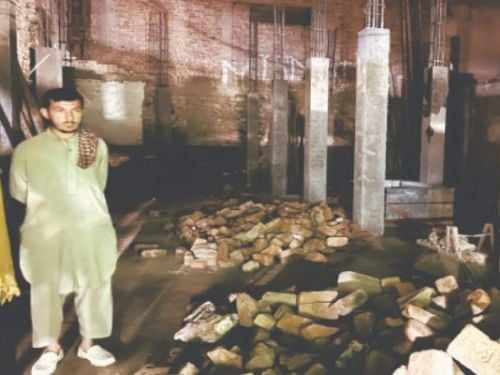
A historically significant Hindu temple near the Pakistan-Afghanistan border, located in the Khyber Pakhtunkhwa province, has been demolished in Pakistan. Construction has commenced for a commercial complex at the site, which had remained closed since 1947 when the original occupants migrated to India. Known as the ‘Khyber Temple,’ it once stood in the border town of Landi Kotal Bazaar in the Khyber district but had gradually fallen into disrepair over the years with the Islamic state ignoring its upkeep. The construction work for the shopping complex began approximately 10-15 days ago. Officials from various administrative departments of Pakistan either claimed ignorance about the temple’s existence, or asserted that the construction was being carried out in compliance with regulations.
Local journalist Ibrahim Shinwari questioned the claims of the district administration and municipal authorities that the temple has no official land records. He said, “The temple was located in the centre of the Landi Kotal bazaar, which was closed in 1947 after the local Hindu families migrated to India. It was partially damaged by some clerics and others in 1992 following the demolition of the disputed structure at Ayodhya in India.”
He added, “There is no doubt in it that there was a temple named ‘Khyber Temple’ in Landi Kotal.” He also recalled that as a child, he heard many stories about the temple from his forefathers.
Haroon Sarabdiyal, representing the Pakistan Hindu Mandir Management Committee, emphasised that it falls upon the district administration and pertinent government bodies to guarantee the preservation and restoration of historically significant religious structures belonging to non-Muslim communities.
He said, “The archaeology and museums department, police, culture department, and local government were bound by the 2016 antiquity law to protect such sites, including places of worship.”
Muhammad Irshad, the Assistant Commissioner of Landi Kotal, expressed unawareness regarding the demolition of the temple. He stated that the official land records of the Khyber tribal district did not refer to the temple’s existence. He said, “The entire land in Landi Kotal Bazaar was owned by the state.”
The official affirmed that a “no objection certificate” has been issued to the builder for the restoration and repair of certain old shops in Landi Kotal Bazaar. Furthermore, the tehsil municipal authorities have authorised the construction of commercial buildings or shops in all commercial and trade hubs within tribal districts.
Shahbaz Khan, the Tehsil Municipal Officer (TMO), clarified that the local government is empowered to approve the construction of all commercial buildings in the region only after their maps or blueprints are sanctioned and the necessary fees are paid. Abdus Samad, the former TMO under whose administration the agreement for the construction of a commercial building was made, expressed total unawareness regarding any directives issued by his office.
Ibrahim Shinwari reacting to this apathy by the administration said, “It is the responsibility of the auqaf department to maintain and preserve historical non-Muslim places of worship, but the department had no office or employees in the Khyber tribal district. Many aged tribal elders would bear testimony to this fact that there was a temple in the main Landi Kotal Bazaar.”
Haroon Sarabdiyal of the Pakistan Hindu Mandir Management Committee said that the places, which were either not used by minorities or in a dilapidated condition, could be utilised for any social welfare activity for the collective benefit of the local communities.
Source: OpIndia

 Shiv Sena leader demands action against Bigg Boss OTT 3 over ‘obscene’ content
Shiv Sena leader demands action against Bigg Boss OTT 3 over ‘obscene’ content Conduct a thorough enquiry of individuals coming to Vishalgad Fort from Hyderabad involved in distributing money to the local Muslims : Ramesh Shinde, HJS
Conduct a thorough enquiry of individuals coming to Vishalgad Fort from Hyderabad involved in distributing money to the local Muslims : Ramesh Shinde, HJS Kalki 2898 AD: Legal notice served to team for allegedly hurting Hindu sentiments
Kalki 2898 AD: Legal notice served to team for allegedly hurting Hindu sentiments NGO worker distributes books on Jesus to the school students in Vidisha (MP)
NGO worker distributes books on Jesus to the school students in Vidisha (MP) Kanwar Yatra: SC stays U.P., Uttarakhand directives to display names of food stall owners and staff en route
Kanwar Yatra: SC stays U.P., Uttarakhand directives to display names of food stall owners and staff en route No one will be treated unfairly; all encroachments on Vishalgad will be removed – Maharashtra CM’s Assurance
No one will be treated unfairly; all encroachments on Vishalgad will be removed – Maharashtra CM’s Assurance